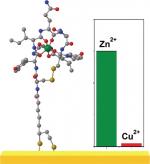Citation:

Abstract:
Oxytocin is a peptide hormone with high affinity to both Zn2+ and Cu2+ ions compared to other metal ions. This affinity makes oxytocin an attractive recognition layer for monitoring the levels of these essential ions in biofluids. Native oxytocin cannot differentiate between Cu2+ and Zn2+ ions and hence it is not useful for sensing Zn2+ in the presence of Cu2+. We elucidated the effect of the terminal amine group of oxytocin on the affinity toward Cu2+ using theoretical calculations. We designed a new Zn2+ selective oxytocin-based biosensor that utilizes the terminal amine for surface anchoring, also preventing the response to Cu2+. The biosensor shows exceptional selectivity and very high sensitivity to Zn2+ in impedimetric biosensing. This study shows for the first time an oxytocin derived sensor that can be used directly for sensing Zn2+ in the presence of Cu2+.


